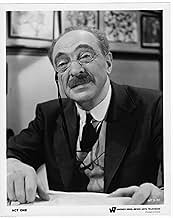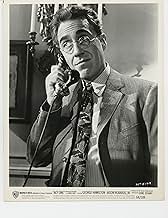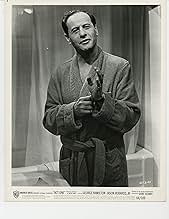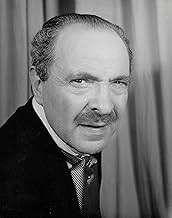Story of the life of writer/playwright Moss Hart.Story of the life of writer/playwright Moss Hart.Story of the life of writer/playwright Moss Hart.
Jonathan Goldsmith
- Teddy Manson
- (as Jonathan Lippe)
- Director
- Writers
- All cast & crew
- Production, box office & more at IMDbPro
Featured reviews
Four years before his death in 1961 Moss Hart wrote his incredibly successful autobiography Act One where he detailed the story of his life as the son of a cigar maker until the opening night of his first Broadway success, Once In A Lifetime. The film skips all of his childhood and early adulthood and concentrates on the creation of that first success and the process that went into it.
With Dore Schary producing and directing the film for Warner Brothers it certainly could be said that this was someone who knew the creative process and could empathize with Moss struggling to write that first success, accepting the help of George S. Kaufman who had already achieved success on Broadway as a collaborator with such folks as Morrie Ryskind and Edna Ferber and Marc Connelly. Two heads are often better than one when it's right two heads.
As this was written way before Stonewall, the gay side of Moss Hart was certainly not explored. Moss Hart married Kitty Carlisle and they did have two children, but Moss was forever a man on the prowl as any number of Broadway folks could have attested to back in the day. Young George Hamilton may not have looked Jewish, but he certainly gave off some attractive vibes.
With his hair styled as a straight up flat top and a pair of glasses, Jason Robards, Jr. was the spitting image of George S. Kaufman who probably put more wit into the mouths of actors than anyone else in the last century, not to mention some of the offhanded cracks he was credited with. Ruth Ford played a sympathetic first wife who was soon to be an injured innocent party when Kaufman got dragged into Mary Astor's divorce case via her diary. According to her Kaufman had more than wit available in his arsenal.
Eli Wallach puts in an appearance as a producer who was supposed to be based on Jed Harris who was one of the most disliked men on Broadway, the spiritual father of David Merrick later on. He doesn't get much to work with so it's not one of his better portrayals.
You also had to love that delicatessen round-table that included such folks as Jack Klugman, George Segal, and Bert Convy playing a young actor named Archie Leach. As Cary Grant said in His Girl Friday, no one ever heard from him again. Sort of a warm up for Hart of the famous Algonquin round-table where he and Kaufman were charter members.
Moss Hart probably came along at one of the peak times for creativity in the American theater and he became a very big part of it. He also got over his distaste for musicals being associated with quite a few good ones in his time, the last being Camelot. Maybe had he lived we might have seen an Act Two. But his whole life was one big creative process.
With Dore Schary producing and directing the film for Warner Brothers it certainly could be said that this was someone who knew the creative process and could empathize with Moss struggling to write that first success, accepting the help of George S. Kaufman who had already achieved success on Broadway as a collaborator with such folks as Morrie Ryskind and Edna Ferber and Marc Connelly. Two heads are often better than one when it's right two heads.
As this was written way before Stonewall, the gay side of Moss Hart was certainly not explored. Moss Hart married Kitty Carlisle and they did have two children, but Moss was forever a man on the prowl as any number of Broadway folks could have attested to back in the day. Young George Hamilton may not have looked Jewish, but he certainly gave off some attractive vibes.
With his hair styled as a straight up flat top and a pair of glasses, Jason Robards, Jr. was the spitting image of George S. Kaufman who probably put more wit into the mouths of actors than anyone else in the last century, not to mention some of the offhanded cracks he was credited with. Ruth Ford played a sympathetic first wife who was soon to be an injured innocent party when Kaufman got dragged into Mary Astor's divorce case via her diary. According to her Kaufman had more than wit available in his arsenal.
Eli Wallach puts in an appearance as a producer who was supposed to be based on Jed Harris who was one of the most disliked men on Broadway, the spiritual father of David Merrick later on. He doesn't get much to work with so it's not one of his better portrayals.
You also had to love that delicatessen round-table that included such folks as Jack Klugman, George Segal, and Bert Convy playing a young actor named Archie Leach. As Cary Grant said in His Girl Friday, no one ever heard from him again. Sort of a warm up for Hart of the famous Algonquin round-table where he and Kaufman were charter members.
Moss Hart probably came along at one of the peak times for creativity in the American theater and he became a very big part of it. He also got over his distaste for musicals being associated with quite a few good ones in his time, the last being Camelot. Maybe had he lived we might have seen an Act Two. But his whole life was one big creative process.
It's 1929. Moss Hart (George Hamilton) is a young struggling playwright in Brooklyn. He writes five serious plays but there is no taker. Joe Hyman (Jack Klugman) is his best friend and tireless supporter. He teaches a class where he befriends student Lester Sweyd (George Segal). Eventually, he comes up with a comedy about the transition into movie talkies. It attracts director George S. Kaufman (Jason Robards).
George Hamilton has a deliberate speaking style which gives the performance lesser intensity. He should be a desperate man but I only sense that in a couple of scenes. He's the opposite of the emotional acting of James Dean. There is a sense of staleness to the movie. The guys are doing some kind of Algonquin Round Table without the witty banter and sharp takedowns. It's an autobiography of Moss Hart but it could take some liberties if only to inject some drama into this dull production.
George Hamilton has a deliberate speaking style which gives the performance lesser intensity. He should be a desperate man but I only sense that in a couple of scenes. He's the opposite of the emotional acting of James Dean. There is a sense of staleness to the movie. The guys are doing some kind of Algonquin Round Table without the witty banter and sharp takedowns. It's an autobiography of Moss Hart but it could take some liberties if only to inject some drama into this dull production.
"Act One" was a 1963 Dore Schary production, released through Warner Bros. and written and directed, as well as produced, by Schary, based on Moss Hart's entertaining memoir of his start in the theatre. After having had five of his plays — all serious dramas modeled after the works of Eugene O'Neill — rejected, Hart (George Hamilton) decides to take the advice of his friend and patron Joe Hyman (Jack Klugman) and his sort-of agent Richard Maxwell (Sam Levene) and write a comedy instead. He has no idea what he's going to do for a comedy plot until he reads an issue of *Variety* and notes that the featured story in it is the turmoil being caused in Hollywood by the advent of talking pictures. He concocts a story called "Once In a Lifetime" and drafts a play on it, only to get the runaround from a producer named Warren Simon, who keeps him waiting in the lobby of Simon's hotel for two days (during which time he's nearly bitten several times by an obnoxious small dog one of the bellboys is walking for a guest — I kept waiting for the payoff of the gag to be that it's Warren Simon's dog, but somehow Messrs. Hart and Schary missed that one). A friend of his who has a contact with the legendary producer Sam Harris (the man who partnered with George M. Cohan for years, gave the Marx Brothers their first major hit, "The Cocoanuts," and was reportedly so wonderful and sweet to everyone that the nastiest thing anyone could ever remember him saying about anybody was in 1933, when the Nazis took power in Germany, about which his comment was, "Hitler is not a nice fellow") gets Hart's play a reading in Harris's office, whereupon Harris's verdict is he'll produce it if Hart can get the legendary George S. Kaufman (Jason Robards, Jr.) to rewrite and direct it.
Work starts on the script, accompanied by a lot of bouncy underscoring by Skitch Henderson that doesn't sound anything like the real pop music of the 1920's and 1930's (and the "source" music heard throughout the film is only marginally closer!), and Schary proves utterly unable to make the on-screen act of writing seem dramatic. He may also have been hamstrung by being unable to quote more than snippets of the actual play Hart and Kaufman wrote: "Once in a Lifetime" was bought by Universal and filmed by them in 1932, and in the early 1970's PBS showed the film and hailed it as a major rediscovery — then it got stuffed back in the vaults and hasn't been let out since then! (The actual film of "Once in a Lifetime" and "Act One" would make an interesting double bill, and it definitely goes alongside "The Power and the Glory" and "The Man Who Reclaimed His Head" among the early-1930's movies that remain frustratingly unavailable on DVD.) Hart called the book on which the film was based "Act One" to denote that he wasn't writing his entire life story — just the start of his career — and it's full of wonderful Jewish character actors (including an unrecognizable George Segal at the start of his career as Hart's nihilistic friend Lester Sweyd). "Act One" the book I remember as a charming but also thrilling memoir that made the act of writing seem as vertiginously exciting as watching a tightrope walker; "Act One" the movie is charming but also awfully sentimental (a flaw in Hart's writing generally; just compare the well-made but sometimes sugary script he wrote for the 1954 version of "A Star Is Born" to the marvelously acerbic one Dorothy Parker co-wrote for the 1937 original), and George Hamilton doesn't look particularly Jewish (especially by comparison with the real-life Jews playing his parents, Martin Wolfson and Sylvia Straus!) but he acts the part well enough within limits — Charles commented that Hamilton's acting skills actually seemed to deteriorate as he got older and lost his boyish good looks! — and the supporting cast is a delight, especially Robards (though one wonders how someone that curmudgeonly could come up with so many great funny lines in his plays!) and Klugman.
Work starts on the script, accompanied by a lot of bouncy underscoring by Skitch Henderson that doesn't sound anything like the real pop music of the 1920's and 1930's (and the "source" music heard throughout the film is only marginally closer!), and Schary proves utterly unable to make the on-screen act of writing seem dramatic. He may also have been hamstrung by being unable to quote more than snippets of the actual play Hart and Kaufman wrote: "Once in a Lifetime" was bought by Universal and filmed by them in 1932, and in the early 1970's PBS showed the film and hailed it as a major rediscovery — then it got stuffed back in the vaults and hasn't been let out since then! (The actual film of "Once in a Lifetime" and "Act One" would make an interesting double bill, and it definitely goes alongside "The Power and the Glory" and "The Man Who Reclaimed His Head" among the early-1930's movies that remain frustratingly unavailable on DVD.) Hart called the book on which the film was based "Act One" to denote that he wasn't writing his entire life story — just the start of his career — and it's full of wonderful Jewish character actors (including an unrecognizable George Segal at the start of his career as Hart's nihilistic friend Lester Sweyd). "Act One" the book I remember as a charming but also thrilling memoir that made the act of writing seem as vertiginously exciting as watching a tightrope walker; "Act One" the movie is charming but also awfully sentimental (a flaw in Hart's writing generally; just compare the well-made but sometimes sugary script he wrote for the 1954 version of "A Star Is Born" to the marvelously acerbic one Dorothy Parker co-wrote for the 1937 original), and George Hamilton doesn't look particularly Jewish (especially by comparison with the real-life Jews playing his parents, Martin Wolfson and Sylvia Straus!) but he acts the part well enough within limits — Charles commented that Hamilton's acting skills actually seemed to deteriorate as he got older and lost his boyish good looks! — and the supporting cast is a delight, especially Robards (though one wonders how someone that curmudgeonly could come up with so many great funny lines in his plays!) and Klugman.
I am an actress and the book "Act One" is one of my favorites and a must-read for every actor, director, producer, etc. I know. The kind of book I re-read every 5 years or so. This movie was a disgrace. Although it had some good actors in it: Jason Robards, Jack Klugman, George Segal. Just awful and a slap in the face to the great Moss Hart. Bert Convy as "Archie Leach", a.k.a. Cary Grant and no English accent? What was that? Also, Moss Hart's family lived in grinding poverty and that was not shown accurately. The apartment they lived in looked much too nice. One of the many horrible things about it was the score! Intrusive, inappropriate, childish. Shame on you, Skitch Henderson!
The movie, unlike the weighty memoir upon which it was based, is a typical showbiz-in-the-1920s yarn about a young man making it big on Broadway in spite of his own insecurity and the many setbacks in the production of his first play. It is satisfying as such, with memorable performances by Jason Robards as the grumpy genius George S. Kaufman, Bert Convy as the struggling Archie Leach, and Eli Wallach as a Jed Harris-like obnoxious producer, and many other cameos of well known actors playing legendary New Yorkers of the day.
George Hamilton was too suave, too dapper, and just too damn pretty to be all that convincing as Moss Hart, but he was at his peak here, and he does a pretty good acting turn.
The story is predictable, but the movie still works, depicting a legend in an industry that loves legends about itself. There is a show playing in New York now based on the same material, and it is a huge hit. Maybe it portrays more of the poverty and the agony from which the real Moss Hart sprang, I don't know; but this movie hardly attempts to do that. Instead it gives us another fantasy of a time and place we love to think about and a life we would love to live. If you're not interested in that, this movie is not for you.
George Hamilton was too suave, too dapper, and just too damn pretty to be all that convincing as Moss Hart, but he was at his peak here, and he does a pretty good acting turn.
The story is predictable, but the movie still works, depicting a legend in an industry that loves legends about itself. There is a show playing in New York now based on the same material, and it is a huge hit. Maybe it portrays more of the poverty and the agony from which the real Moss Hart sprang, I don't know; but this movie hardly attempts to do that. Instead it gives us another fantasy of a time and place we love to think about and a life we would love to live. If you're not interested in that, this movie is not for you.
Did you know
- TriviaFirst film role of Jonathan Goldsmith (as Jonathan Lippe), who portrayed Teddy Manson, and who is now much better known as "The Most Interesting Man in the World" from Dos Equis beer TV commercials.
- GoofsIn an early scene, Moss Hart (George Hamilton) hears a radio news broadcast reporting that Colonel Theodore Roosevelt has just returned from an Asian excursion and that the "former president was in excellent spirits". This refers to an actual news event reported on September 10, 1929, but it was President Roosevelt's son, also named Theodore, who made the trip. The former president had died in 1919.
The radio also reports that the New York Yankees defeated the Detroit Tigers 9-3 the previous day, but the game occurred two days earlier and the previous day's game had been postponed because of rain. The news report is read nearly verbatim from the New York Times' account of the game.
- Crazy credits"Curtain" (instead of "The End")
- ConnectionsReferenced in I've Got a Secret: George Hamilton (1963)
Details
- Runtime
- 1h 50m(110 min)
- Color
- Aspect ratio
- 1.66 : 1
Contribute to this page
Suggest an edit or add missing content
































